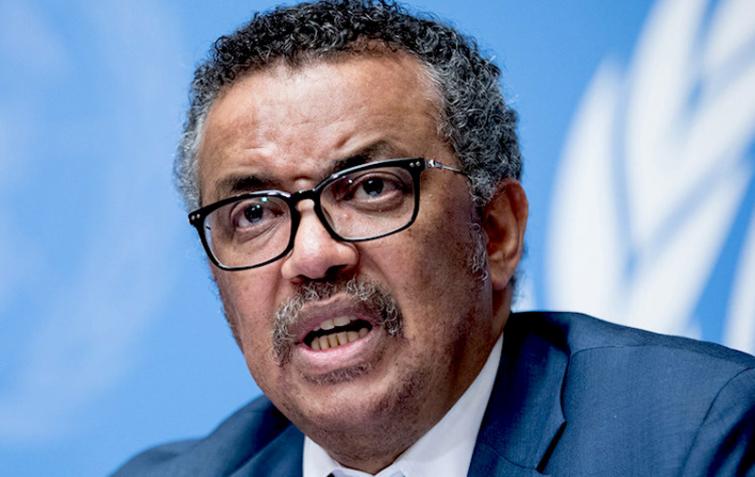 Tedros
Tedros
Global partnership to make available 120 million affordable, quality COVID-19 rapid tests for low- and middle-income countries: WHO
Geneva: A set of agreements to make available, for low and middle-income countries, affordable, high-quality COVID-19 antigen rapid tests were on Monday announced by the Access to COVID-19 Tools (ACT) Accelerator. Organizations involved in the milestone agreement include the Africa Centres for Disease Control and Prevention (Africa CDC), the Bill & Melinda Gates Foundation, the Clinton Health Access Initiative (CHAI), the Foundation for Innovative New Diagnostics (FIND), the Global Fund, Unitaid, and the World Health Organization (WHO).
As part of this comprehensive, end-to-end effort, the Bill & Melinda Gates Foundation has executed separate volume guarantee agreements with rapid diagnostic test (RDT) producers Abbott and SD Biosensor.
These two arrangements will make available to LMICs 120 million antigen rapid diagnostic tests (Ag RDTs) – priced at a maximum of US$5 per unit – over a period of six months.
These tests provide results in 15–30 minutes, rather than hours or days, and will enable expansion of testing, particularly in countries that do not have extensive laboratory facilities or trained health workers to implement molecular (polymerase-chain reaction or PCR) tests.
The tests developed by Abbott and SD Biosensor are highly portable, reliable, and easy to administer, making testing possible in near-person, decentralized healthcare settings.
Both companies’ tests are faster and cheaper than laboratory-based tests, enabling countries to increase the pace of testing, tracing and treating people for COVID-19 at the point of care particularly in areas with under-resourced health systems.
A number of other Ag RDTs are at various stages of development and assessment.
To scale up the Ag RDTs, the Global Fund today announced that it has made available an initial US$50 million from its COVID-19 Response Mechanism to enable countries to purchase at least 10 million of the new rapid tests for LMICs at the guaranteed price, with the first orders expected to be placed this week through the Global Fund’s pooled procurement mechanism.
FIND and WHO are working together to accelerate appropriate use by supporting implementation research that will optimize Ag RDT use in multiple LMICs, in line with WHO guidance. This includes provision of catalytic volumes of tests to understand how Ag RDTs can best fit into health systems.
Unitaid and Africa CDC will combine resources to initiate the roll out of these tests in up to 20 countries in Africa starting in October 2020.
This multi-million-dollar intervention, currently undergoing final sign-off by their Boards, is designed to engage multiple partners active in the COVID-19 response in these countries, such as CHAI, African Society for Laboratory Medicine (ASLM) and local organizations.
This will bolster efforts by the African Union’s Partnership to Accelerate COVID-19 Testing (PACT) initiative, launched in August 2020 to mobilize experts, community workers, supplies and other resources to minimize the impact of the pandemic on the African continent by testing, tracing, and treating COVID-19 cases in a timely manner.
Testing is a critical cornerstone of the COVID-19 response, enabling countries to trace and contain the virus now, and to prepare for the roll-out of vaccines once available.
Effective testing strategies rely on a portfolio of test types that can be used in different settings and situations.
While molecular tests started to be rolled out within a month of the virus being sequenced, these tests are mainly laboratory based, relying on infrastructure and trained personnel to conduct them.
Rapid tests to detect the presence of the virus at the point of care, which are faster and cheaper, are a vital addition to the testing arsenal needed to contain and fight COVID-19.
WHO guidance published on 11 September 2020 highlights the value of these tests in areas where community transmission is widespread and where nucleic acid amplification-based diagnostic (NAAT) testing is either unavailable or where test results are significantly delayed.
As well as supporting test-trace-isolate strategies, the tests can help identify or confirm new outbreaks, support outbreak investigations through screening; monitor disease trends; and potentially test asymptomatic contacts.
The ACT-Accelerator Diagnostics Pillar is co-convened by FIND and the Global Fund, working closely with WHO and over 30 global health expert partners to accelerate innovation and overcome the technical, financial, and political obstacles to achieving equitable access to effective and timely testing.
Such unprecedented global collaboration has enabled development and deployment of the first WHO EUL-approved Ag RDT within eight months of the first identification of the virus. In comparison, it took nearly five years to develop the first RDT for HIV.
Several more antigen RDTs for COVID-19 are currently under WHO EUL review. Overall, the ACT-Accelerator Diagnostic Pillar aims to facilitate the supply of 500 million tests to LMICs within 12 months.
These agreements are critical to fulfil the key objective of the ACT-Accelerator: to ensure all countries, regardless of income, have fair access to new tests and tools to fight COVID-19.
The exceptional speed with which the Ag RDT access package has been created demonstrates the breadth of the impact of the ACT-Accelerator initiative, and this and future achievements in testing will complement similar milestones anticipated to emerge from the Vaccines and Therapeutics Pillars.
Dr Tedros Adhanom Ghebreyesus, Director General of WHO, said: “High-quality rapid tests show us where the virus is hiding, which is key to quickly tracing and isolating contacts and breaking the chains of transmission. The tests are a critical tool for governments as they look to reopen economies and ultimately save both lives and livelihoods.”
Support Our Journalism
We cannot do without you.. your contribution supports unbiased journalism
IBNS is not driven by any ism- not wokeism, not racism, not skewed secularism, not hyper right-wing or left liberal ideals, nor by any hardline religious beliefs or hyper nationalism. We want to serve you good old objective news, as they are. We do not judge or preach. We let people decide for themselves. We only try to present factual and well-sourced news.







